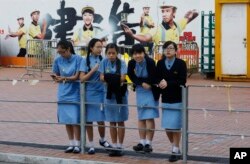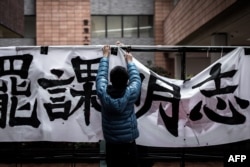Calls for Hong Kong students to be taught a more positive view of mainland China are sparking controversy in the former British colony.
A former head of Hong Kong’s Legislative Council recently said that Hong Kong schools give students a biased perspective of the mainland.
Speaking with China’s state-run Xinhua News Agency, Rita Fan, now a National People’s Congress Standing Committee member, said that Hong Kong students learn about the flaws of China’s central government, but few of the achievements.
At last week’s meeting of China’s NPC, Fan also said Hong Kong’s youth do not know enough about China’s history.
Her comment has prompted criticism by Democratic Party chairwoman Emily Lau.
Lau said Hong Kong’s representatives to Beijing should more adequately represent the concerns and worries of the city’s people.
“Well, they should have a more accurate grasp of what’s happening here, so when they go to Beijing they can give a more accurate picture and representation to the central government,” Lau said, citing recent protests in the city.
Proposed reforms
In 2012, a booklet called “The China Model” outlined planned reforms for Hong Kong’s education system, and prompted mass demonstrations. The booklet praised China’s model of governance, and was critical of multi-party systems. It included pictures of Chinese leaders, and said the Communist Party was “progressive, selfless and united.”
Tens of thousands of people, including teenage students, demonstrated against the proposed reforms.
Democracy activist Joseph Cheng said that was only the beginning of a sustained push for curriculum that would inspire patriotism in Hong Kong’s youth.
“I do believe that the education sector, the primary and secondary schools, are now a very important focus of the pro-Beijing united front. They certainly have been demanding stronger patriotic programs,” Cheng said.
Simplified vs traditional characters
Last month, Hong Kong’s Education Bureau released a consultation document which called for Hong Kong students “to recognize and read simplified Chinese, in order to expand students’ reading range and strengthen communication with mainland and foreign students.”
Hong Kong uses traditional characters, while simplified characters, a set of Chinese characters with reduced strokes, is used widely in mainland China. The document prompted criticism and protests, and since its release the Education Bureau has said it has no intentions to replace traditional characters with the simplified form.
The debate over Chinese characters came in the same month a violent riot erupted in the neighborhood Mong Kok, where demonstrators said they were protesting against the erosion of traditional Hong Kong culture.
Teachings not balanced
Sally Tang Mei-Ching, chairperson of Socialist Action, said Hong Kong’s youth strongly oppose mainland China’s growing political and cultural influence on the city.
“They teach students how to appreciate the Communist Party, but in a very biased way. So this is why a lot of young people really hate China, not China as a whole, but the Chinese regime, because we want democratic rights,” she said.
This week, Joshua Wong, a pro-democracy activist who founded Scholarism in 2011, a group which played a major role in the 2012 protests against education reform in Hong Kong, announced the dissolution of that group.
Next month Wong plans to form a new political party and is now calling for Hong Kong to declare independence in 2047, when the 1997 handover agreement between China and Britain will expire.







